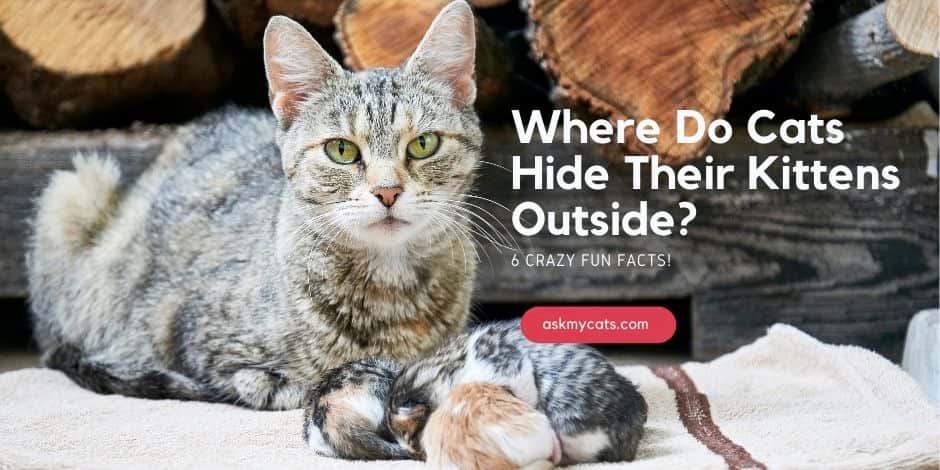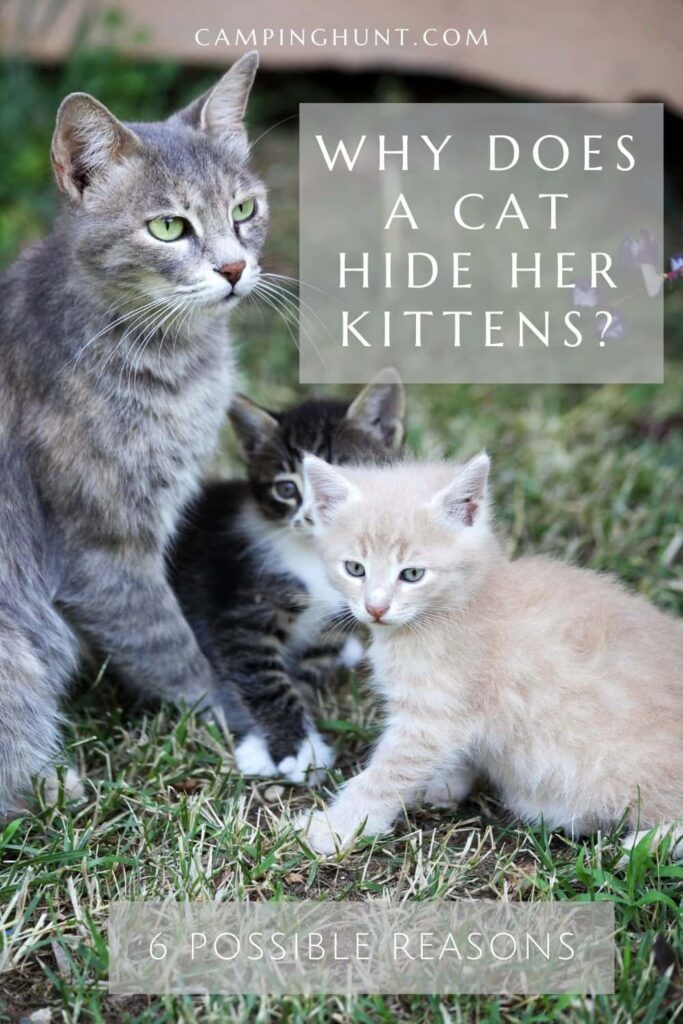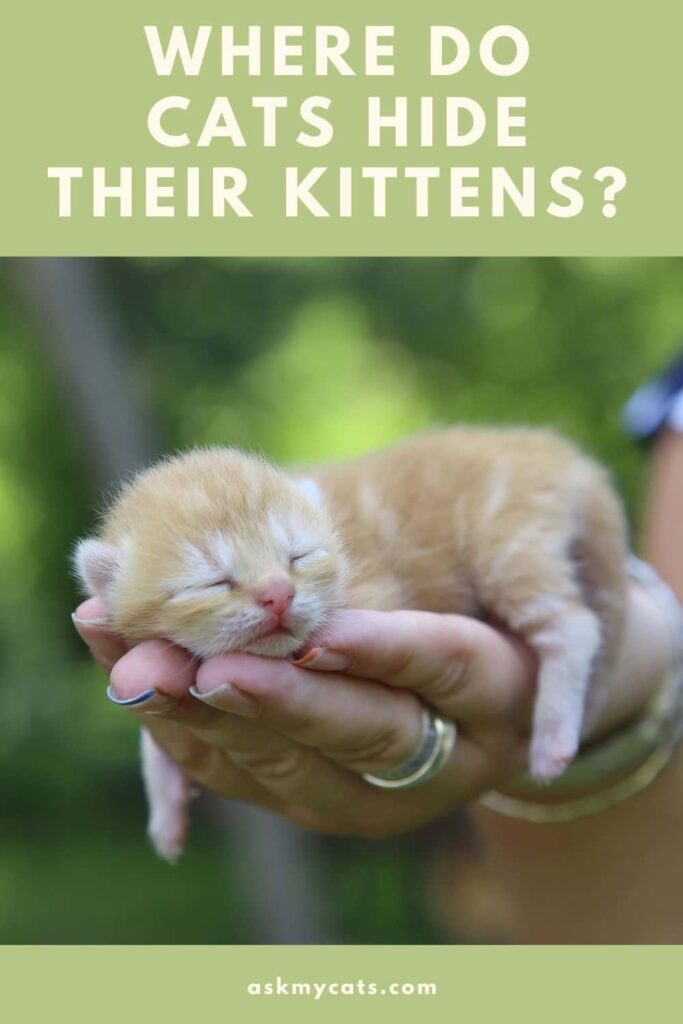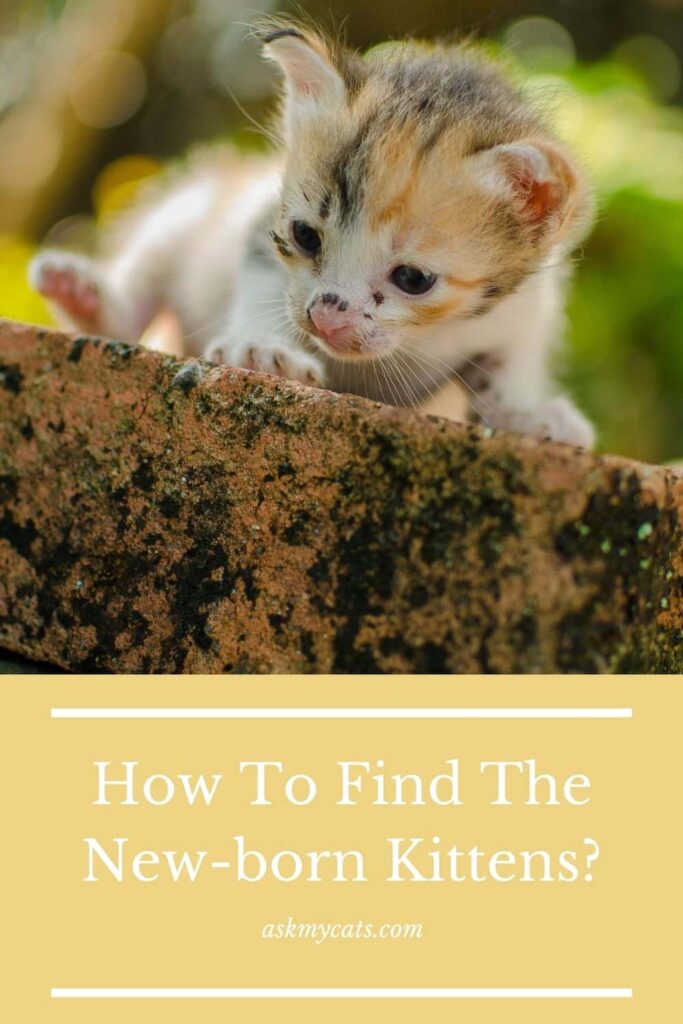Although people have had both cats and dogs for decades, cats are comparatively recent arrivals when you consider the amount of time those animals have been domesticated on this planet.
A frightened cat could hide their kittens in the bushes, in the sheds, under the decks. Try to look up too, because cats prefer high places, and they may be hidden in the roots of a tree or on the roof of a store or shed.
It’s a smart idea to search for a peaceful time of the day. You should search with a torch after dark.
A cat also has kittens outdoors, even though the cat spends a lot of time at home.
If your cat is having kittens outdoors, this article will help you understand why it happened and how to help her.


Give Your Cat the Perfect Day
Get the Free Ebook!
Why Does A Cat Hide Her Kittens? 6 Possible Reasons

1. Instinct Tells!
Cats have instinctive actions much more profoundly rooted than dogs. Also, the sweetest cats seem to be secretive in a few respects.
They enjoy tight, comfortable spaces away from noise and discomfort. They may conceal or bury their food and they can also be very territorial.
Even kneading as they love being scratched is an instinctive reaction. Another instinctive trait that cats have is hiding their infants, even though they know and trust their relatives.
2. Protection
Feral cats or backyard cats are covering their puppies to shield them from predators. Like dogs, kittens are born physically challenged, depending only on their mother to keep them healthy.
Wolves, hawks, eagles, and even domesticated dogs all pose a real threat to her kittens, so the trick is a safe, secluded location. Like the proud male lions, tom cats will also kill any kittens in their territories.
Thus it means that the mother cat will go back to heat sooner and give her a better opportunity of mating with her and transferring on her genetic material rather than that of a male competitor in the neighborhood.
3. Sssh! It’s a Secret
Safety and secrecy go hand in hand. If a cat had kittens, she’d want a spot that’s far away from a lot of movement, even at home.
In addition, if the room is too noisy or too bright, she may decide to move her kittens to a more isolated location.
Often, an indoor mother cat moves her kittens to an area like a closet, under a bed, behind a couch, or even a kitchen counter. Once there, it may also decide that the area has become its territory and defend it aggressively, even from its owners.
Remember that instinct plays a massive role in this, so don’t shout or otherwise show abusive tendencies towards the cat.
4. Just A Normal Behavior
Cats prefer to be private creatures, regardless of their living circumstances. House cats and stray or feral cats are similar in that they prefer to find a safe and secure place for their kittens.
A cat is going to spend some time scoping out places to give birth, and sometimes the place she ends up in isn’t her first choice. In such cases, or if Mom feels her place has been compromised, she may move her brood.
For outdoor cats, reasons to relocate a litter may include the existence of predatory animals (such as dogs and birds of prey) or exposure to climatic conditions.
5. Need Space
Be gentle and encourage your kitty to take care of her kittens in a peaceful area, away from the intrusion of children and other animals. You can make sure that she has plenty of food and fresh water nearby and watch her for signs of fear.
If she appears nervous, she might feel that her kittens aren’t healthy. Offer her room and time to relax with her new family in her surroundings.
6. Not An Attention Seeker
Kittens are cute, and they love to cuddle with them both. It’s best to fight the urge for a bit, though, for the sake of mom and her son.
If Missy is uncomfortable with the spotlight, she’s going to switch them again. It’s best to say that she needs more privacy than less.
Some say it’s best to wait about three weeks for the kittens to be treated—do not touch them until their eyes are open.
Children should be constrained in their contact with tiny kittens and should still be monitored by adults while they are with infants. Before touching young kittens, everybody can wash their hands.
If you come across a litter of stray or wild kittens outside, do not presume that your mother has neglected or damaged them. Sometimes, the mother is going to be busy securing food or moving the garbage. It’s best to wait to see if the mother is coming back for her kittens.
It will be interesting read about how to tell if a mother cat has abandoned her kittens
Where Do Cats Hide Their Kittens?

So as we know there can be multiple reasons why cats hide their newborn kittens, it is very much important to know possible places where you can find them.
Most probably cat will find a spot which quiet, dark, out of the way, low on traffic from humans/animals, and difficult for other animals besides the mother cat to reach.
Here are some of the examples where you might find a newborn kitten hidden in my mommy cat.
- Under porches
- Empty boxes lying around
- Under homes, if the cat has access to the crawl space
- Under the bed in the lining under the box springs
- Behind the refrigerator
- In barns, usually, the loft or a difficult-to-reach cubby area
- Bathroom linen closet
- Abandoned structures
- Any area that has a cubby-type depression or cave-like opening that offers a small easily defended opening with plenty of room for mother and kittens
How To Find The New-born Kittens?
If your pet has kittens outdoors, or if you know about a nearby wild cat that had kittens, you’ll most likely be keen to find out where they are.
Unfortunately, the cats are very, very good at covering their kitties, so you have to rely on three simple strategies, all of which rely on the mother.

Track her
As is more often the case for wild cats, you need to keep a sharp eye on your mother.
Chances are, she has no human confidence, and she will never be able to take you to her kitten. Look at her instead.
Take notice of the places that she most frequents. Of those places, launch your search with the one that seems most secluded and peaceful.
As mentioned earlier, the most possible areas for kittens to be discovered would be in buildings such as sheds or under porches, in creeping areas, or in barns.
Just take a look at the quietest location and start looking there.
Follow Secretly
Whether your cat has babies, even if the neighborhood cat isn’t wild, but homeless, you would just be able to follow her back to her kittens.
Start to pursue her. If she stops being petted, give her a little affection, and then ignore her until she agrees to go on. Reverse the process, and hopefully, she’ll take you to her kittens.
Continue the cycle, and finally (let’s hope) she’ll take you to her kittens. This really works on really friendly animals, so make sure to take note of the cat’s attitude to human beings before you attempt it out.
Give Her Good Food
A mother cat will need all the food she can get to make enough milk to feed her daughter. She’s going to constantly search for food, so make your home a grocery store for her.
Set out the most wonderful wet and dry meals you can find every day. Don’t worry; she’s going to find it.
With time, she will continue to equate your home with being the main food supply, which will, in essence, cause her to move the kittens to the place near your home so that she can reach the food more quickly.
Don’t try to find the kittens if you know that you’re taking them to your house. Rather, follow her and see where the kittens are. This trick will particularly work if it’s feral.
You’re going to have a pretty good idea of where the kittens are because if you perturb her new comfort zone, she’s just going to move them all over again.
Moving All Of Them Or Just One?
If you see that a cat had kittens out to move a kitten to another location or just to get away from her other kittens, you might see an instinctive drive to kill a sick kitten.
It is a vicious reality of the animal kingdom that only the strong survive. Mother cats can feel that their kittens are unhealthful.
If the kitten is feeble, unable or unwilling to cling on for feeding, or too tiny, the mother cat often leaves the kitten to save her energy for her healthier babies.
Often, people will see a cat moving one of her kittens, assuming the rest is close behind. Later, they discovered that the kitten was not the first to be taken to a new location, but rather was killed.
People often go to a new destination, sometimes only a few feet away to check on the mother and her kittens just to find out that the kitten has been abandoned.
If you see a mother shifting her kitten, keep a close eye out for the rest of the kittens to pursue. If you don’t see a mother or more kittens relatively quickly, pick up the kitten if possible and take it to your rescue center immediately.
They have a resource to rehabilitate the kitten and adopt it. If you want to take the kitten yourself, just take it to your local vet for proper care.
Frequently Asked Questions:
Where do cats hide their kittens?
If the situation is too stressful for her, a mother cat can move her kittens. They may be moved to a closet, under a bed, to a dressing room, under or behind a sofa or chair, to a kitchen cabinet, to an attic, or to another strange place where there is no human interference.
How long do cats hide their kittens?
However, if you do this too quickly, Kitty will decide that you interfered with it and move it again. If you have kids, don’t let them in with Kitty and her babies unless you’re there. Kittens aren’t very stable on their feet until they’re about 6 weeks old.
Where would a kitten hide outside?
Look at places where, like in trees, sheds, under decks, a frightened cat could hide. As cats prefer high places and could be hidden in the roots of a tree or on the top of a store or shed, note to look up too. Searching at a peaceful time of day is a smart idea. You can search with a flashlight after dark.
Can kittens survive outside?
Owing to possible illnesses of diseases such as enteritis or cat flu, the kitten should not be released outdoors until at least one week after the first course of vaccine has been completed at around 13-14 weeks of age (depending on the vaccine). If it is monitored, you might let it explore outside.
Will a mother cat abandon her kittens if you touch them?
A mother cat is NOT going to “reject” kittens that humans have touched. Kittens can be removed from their nests only if, after many hours, there is no sign of a mother cat or if the kittens appear to be in immediate danger or distress.
What to do when you find kittens outside?
Leave the family outside, to have housing, food, and water. The mother is sure to move the kittens, so no need to worry. She’ll return with them if she thinks this is a safe place with a secure supply of food.
Final Words
If a cat has kittens out there, it’s important to find them right away. No amount of planning on the part of the mother will completely shield her or her kittens from pests, parasites, or elements.
If she’s your cat, you’re going to want to be around to watch her and the kittens. Whether she is wild, she and her kittens will need to be adequately cared for as soon as possible to ensure the best possible survival.
With the experience you’ve learned here, you should be able to find your mom and your kittens sooner rather than later, which leads to better survival chances.
Has your cat too moved her kittens to the outside? What was your reaction? Were you able to find them again? Don’t forget to let me know in the comments section. That’s enough for today, cat lovers!

We have feral kittens around our house we’ve been feeding.
Two got pregnant. They both had they’re babies. But we can’t find them. One doesn’t look like she has milk left. The other looks like she does. But they both hang around for hours and don’t go to they’re kittens. It’s been about five weeks for the first kitten with babies, about three weeks for the other. No kitty noises either.
We saw three newborn kittens the first mom had, she then moved them and they haven’t been seen since. We’ve looked everywhere and we can’t find them. At this point we think they killed them. They are kitties themselves, is this possible? Are they too young to be moms to take care of these kitties? If so, would they eat the bones and all with no evidence left behind?
There is a lot of bushes, trees shrubs and even a space under the shed. We’ve looked to the best of our abilities, but nothing.
If they are alive, will the moms eventually bring them out to us?
Could they have gone somewhere else to be brought out?
Dear Cindy,
I am so glad that you are actually analysing the whole situation and want to know proper answers to your apprehensions.
Firstly, let me tell you when a cat is too young to give birth, they will have no maternal instincts for their kittens and will try to maintain a distance from them.
Your cat has moved her kittens away because it’s the initial stage and your cat might doesn’t want anybody to leave their scent on her kittens.
If you have detected a situation where it seems your cat has killed her kittens, then it can be because she found a congenital defect on her felines, cat mothers do so to not feel obligated to raise them and feed them.
Lastly, your cat may want to keep her kittens away from the site and is taking some time out to feed them when needed.
Stick around, maybe they will come along.
Hi my name is Charlie i have a very feral female cat an she had 2 kittens one minute I seen the all the kittens, and last night the mamma cat was caring for them, and I went outside this morning to feed them and they were gone from were they were I’ve searched every where and can’t find them I see mamma cat around then she is gone but I don’t know how to find them, can you give me any advice that will help?
Hey Charlie,
I’ve been there with my own feral cat. Mama cats often move their kittens to safer spots, especially if they feel their current location is exposed. Here’s what you can do:
1. **Stay Observant**: Watch where the mama cat goes. She’ll lead you to them eventually.
2. **Look for Hidden Spots**: Check under bushes, in dense vegetation, or any quiet, hidden areas around your property.
3. **Leave Food Out**: Keep feeding her at the usual spot. She’ll keep coming back for food, and you might catch her heading back to her kittens.
4. **Listen Carefully**: Early morning or late evening, you might hear the kittens mewing.
It can be worrying, but trust that she’s just trying to keep her babies safe. Give it a bit of time, and you’ll likely spot them soon.
Good luck!
Hey Abigail,
Great article, I read it a few weeks ago because I was in a similar situation. I was feeding a semi feral cat who got pregnant outside and I couldn’t find the kittens. I took the easy route and got a GPS tracker for her to find them.
Unfortunately she gave birth in a compound I can’t get access to, she initially had them around 170m from me now they are around 100m from my property but still just inside compound.
The cat comes over twice everyday for food and pets, her kittens are 5 weeks old now. We are definitely her main good source and I wanted to get her inside but not without the kittens.
What are the chances she will bring the kittens to us? Any advice is appreciated.
Ronan
Hey Ronan,
Its hard to predict that will she comeback with her kittens or not.
But at this moment what i can suggest you is to keep nursing her with utmost care and love.
Hi my name is Stephanie Dewson i have a feral female cat an she had 5 beautiful kittens one minute I seen the whole kittens last night an mumma cat was feeding them an bathing them an I went outside this morning an they were gone from were they were I’ve searched every where an carnt find them I see mumma cat around then she is gone but I don’t no where as it is dark now an I don’t go outside after dark
Cats hide their newly born kittens due to privacy. She does not like to have people around when she is feeding her babies. This a normal behavior in cats and nothing to be worried about.
Hello my name is Charlie and I have been feeding a very feral cat and she will not let me pet her, she recently had two kittens under my shed and then moved them, i am surrounded by a lot of forest and I don’t know where she would have moved them. Can you give me any advice on how to find them and where? Please help me, I have been very worried for their sake.
Hey Charlie!
I totally get your worry. I’ve had a feral cat mama do the same thing. They usually move their kittens to a spot they feel is safer. Since you’re surrounded by forest, she’s likely found a hidden, quiet place.
Here’s what you can do:
Stay Calm: She’s doing what she thinks is best for her kittens.
Look for Tracks: Check for small pathways or tracks leading into the forest.
Listen: Early mornings or late evenings, you might hear them mewing.
Stay Consistent: Keep leaving food out; she’ll come back, and you might catch her going to the new spot.
Just give it some time. Feral cats are super protective and smart about hiding their babies. Good luck!